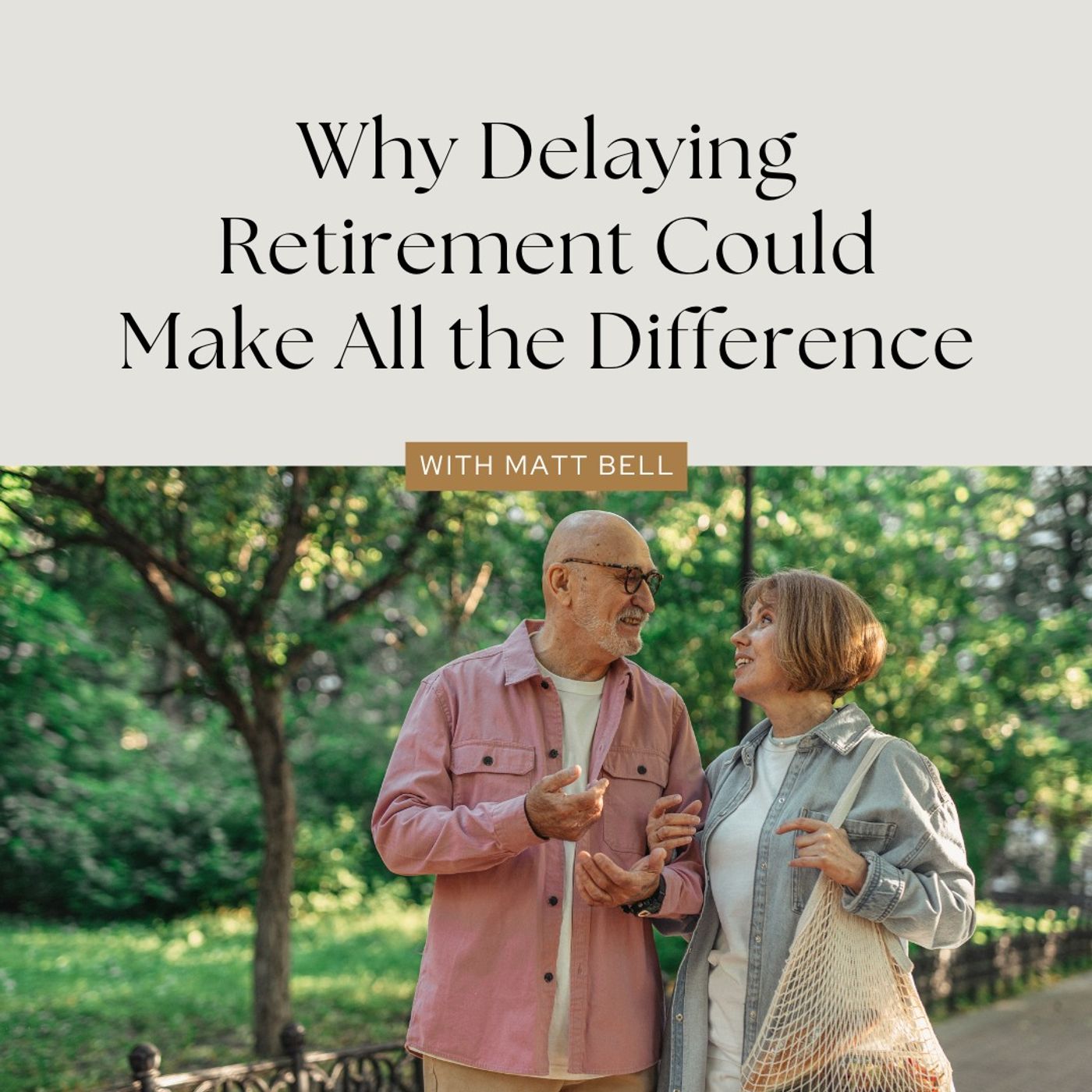Why Delaying Retirement Could Make All the Difference with Matt Bell
- Author
- FaithFi: Faith & Finance
- Published
- Tue 20 May 2025
- Episode Link
- https://www.faithfi.com/
"So teach us to number our days, that we may get a heart of wisdom." - Psalm 90:12
If you're a few years from retirement and your savings aren’t quite where you want them, you might feel like you've run out of time. But maybe you don’t need a time machine to solve the problem. Today, Matt Bell joins us with some encouraging words about beefing up retirement savings.
Matt Bell is the Managing Editor at Sound Mind Investing, an underwriter of Faith & Finance.
The Surprising Power of Working a Little Longer
In 2018, a Stanford study called The Power of Working Longer made a compelling discovery: delaying retirement by just three to six months can have the same impact on retirement readiness as saving an additional 1% of income every year for 30 years.
Yes, really.
This is largely due to two factors:
- Higher Social Security Benefits – For every month you delay past full retirement age, your benefit increases by 2/3 of 1% (8% annually).
- Better Annuity Rates – The older you are when purchasing an annuity, the more monthly income you’ll receive for the same investment.
But there’s a caveat: the study is based on specific assumptions that may not match your financial situation.
What the Study Assumes—and Why It Matters
The Stanford study uses a fictional worker named “John” who:
- Started saving at age 36
- Saved 6% of income and received a 3% match
- Retired at 66 and claimed Social Security immediately
- Used all savings to buy an inflation-indexed annuity
In reality, your income, savings rate, Social Security timing, and withdrawal strategy may differ widely. Not to mention, indexed annuities like the one in the study are no longer widely available. So while the study provides encouragement, its specifics shouldn’t be universally applied.
If you can delay claiming Social Security, it can significantly boost your lifelong income. For example, waiting until age 70 instead of 66 could result in a monthly check that’s 24% higher. You’d need to live roughly 12 more years to “break even,” but many retirees today are living well into their 80s and beyond.
Social Security is essentially a government-backed, inflation-adjusted annuity, making it a powerful foundation for retirement income.
More Benefits to Working Longer
Beyond Social Security, staying employed offers additional financial and emotional perks:
- More Contributions – Additional working years allow you to save more and delay withdrawals.
- Shorter Retirement Span – Fewer retirement years mean your nest egg doesn’t have to stretch as far.
- Health & Community – Work often provides routine, purpose, and social interaction—elements many retirees miss.
Working longer isn’t just a financial decision—it impacts your time, relationships, and expectations. If you’ve long looked forward to travel, family time, or volunteering, extending your career might feel like a loss. That’s why it’s essential to consider both the math and the meaning.
Couples should prayerfully approach retirement planning together. Decisions about timing affect both spouses, especially when only one is working. Unequal expectations can lead to tension, so it's essential to:
- Talk openly about your hopes and concerns
- Understand your financial picture as a team
- Choose unity over independence in decision-making
This is one of the most crucial decisions you’ll make as a couple.
How Much Do You Really Need?
You may have heard that you need 70–80% of your pre-retirement income. That’s a good rule of thumb, but it’s far better to run the numbers yourself. Some costs (like commuting or saving for retirement) may go down. Others (like healthcare or travel) may go up. The best approach? Create a post-retirement budget based on your unique goals and lifestyle.
If you're behind on retirement savings, don’t panic—and don’t go it alone. Tools on the Social Security website can help you run scenarios based on your age and income. Brokerages like Fidelity or Schwab offer annuity estimators. Most importantly, seek wise counsel and pray through your decisions with your spouse.
If you’d like to read the full article from Sound Mind Investing that we discussed during this episode, read Matt’s article titled Retirement Preparedness—What a Difference a Little Time Can Make at SoundMindInvesting.com.
On Today’s Program, Rob Answers Listener Questions:
- I now have the money from my tax return to pay my property taxes, due in two installments—one in May and one six months later. Should I go ahead and pay it all now since I have the funds, or is there a wise short-term investment I could consider in the meantime?
- Is there a reliable resource or organization that can provide information on charities that are requesting donations, such as groups like America Cares, CARE, or Mercy Ships?
- What are your thoughts on the cryptocurrency XRP? Is it something worth considering?
Resources Mentioned:
- Faithful Steward: FaithFi’s New Quarterly Magazine (Become a FaithFi Partner)
- Sound Mind Investing
- Retirement Preparedness — What a Difference a Little Time Can Make by Matt Bell (Sound Mind Investing Article)
- Social Security Administration (SSA.gov)
- ECFA | Charity Navigator | Ministry Watch
- Fidelity | Charles Schwab
- Wisdom Over Wealth: 12 Lessons from Ecclesiastes on Money (Pre-Order)
- Look At The Sparrows: A 21-Day Devotional on Financial Fear and Anxiety
- Rich Toward God: A Study on the Parable of the Rich Fool
- Find a Certified Kingdom Advisor (CKA) or Certified Christian Financial Counselor (CertCFC)
- FaithFi App
Remember, you can call in to ask your questions most days at (800) 525-7000. Faith & Finance is also available on the Moody Radio Network and American Family Radio. Visit our website at FaithFi.com where you can join the FaithFi Community and give as we expand our outreach.
